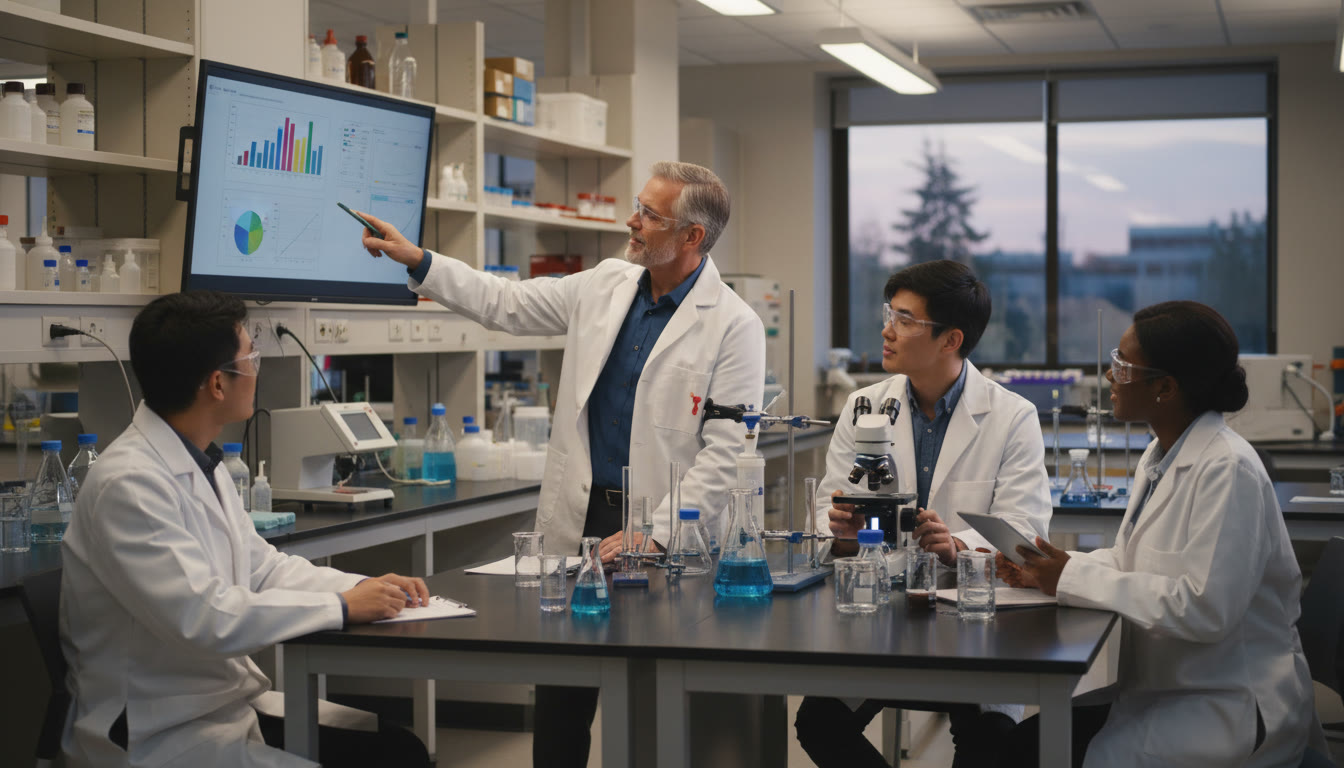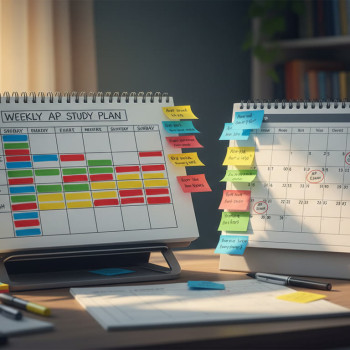Why this matters: AP Lab Sciences and the Med‑School Map
If you’re a student dreaming of medical school, you’ve probably heard the two familiar refrains: “Take AP sciences” and “Get clinical experience.” But there’s an important middle question many families overlook: how will AP lab sciences—AP Biology, AP Chemistry, AP Physics—actually figure into medical‑school preparation and admissions decisions?
Short answer: AP lab courses help academically, but the way they count (credit, placement, or simply evidence of rigor) depends on two separate systems: the College Board’s AP program and each medical school’s own policies. In this post I’ll walk you through the fine print, translate jargon, and give practical steps so your AP lab work helps rather than confuses your med‑school application.

Big picture: Two separate worlds that meet at your transcript
Think of the College Board and medical schools as two neighboring towns with different rules. The College Board offers AP exams and lab manuals that define course content and the expectations for lab investigations. Colleges and universities — and later, medical schools — decide whether to give undergrad credit, placement into a higher course, or simply praise your rigor. Medical schools rarely give course credit for AP exams directly, but they do care about the academic record those APs helped shape.
Important distinction:
- AP Credit/Placement: Often handled by colleges at matriculation; depends on the college’s AP policy and the AP score (typically 3–5).
- Medical School Admissions: Admissions committees evaluate your course rigor, science foundation, and whether you met prerequisites (often prerequisite courses must be taken for letter grades at the undergraduate level).
The College Board’s role: What AP lab sciences deliver
The College Board defines the AP framework: course content, science practices, and lab expectations. For AP lab sciences there’s a strong emphasis on inquiry, data analysis, experimental design, and hands‑on investigations. Those lab experiences are meant to mirror a college introductory lab sequence, and many AP resources — including lab manuals and guided inquiry labs — exist to make sure students get practical, transferable experience.
What that means for you: a well‑taught AP lab course legitimately prepares you for college chemistry, biology, or physics labs. It demonstrates you’ve practiced designing experiments, collecting and analyzing data, and making evidence‑based claims—skills med schools like to see on an application and in letters of recommendation.
AP lab highlights
- Inquiry‑based investigations are central—expect to design experiments, not just follow recipes.
- AP lab manuals and resources aim to meet college equivalency for introductory lab courses.
- AP exam scores can lead to college credit or placement depending on the college.
How medical schools view AP lab sciences: nuance, not a single rule
Medical schools don’t have a single, nationwide stance. Instead, each school sets its expectations for prerequisites, acceptable substitutions, and how it views AP courses on transcripts. That creates a few common scenarios:
- Scenario A — AP as preparation only: Some med schools expect applicants to complete undergraduate biology, chemistry, or physics courses (often with labs) at a college or university — even if you earned AP credit. In this case AP shows you’re prepared, but admissions want to see graded, college‑level coursework on your university transcript.
- Scenario B — AP satisfies undergrad requirement for matriculation: If your college accepted AP for credit and used it to waive an introductory course, med schools that rely on your college transcript may treat the requirement as met. However, some professional schools still request that certain foundational courses be taken at the college level regardless of AP credit—check each school.
- Scenario C — Mixed approach: Some medical schools accept AP credit for prerequisite checks but still favor applicants who completed upper‑level or additional coursework in a subject (for instance, an upper‑division biology course beyond the AP material).
Practical takeaway
Assume AP lab sciences strengthen your preparation and transcript rigor, but verify specific med‑school prereqs and policies early. Don’t treat AP scores as a guaranteed shortcut around required college lab courses unless you’ve confirmed that at the schools you’ll apply to.
Common questions parents and students ask (and clear answers)
1. Will an AP lab count as a college lab for med‑school prerequisites?
Maybe. It depends on both:
- Whether your college accepted AP for credit and how it recorded that on your transcript.
- How the medical school defines prerequisites—some require college transcript evidence of lab coursework regardless of AP credit.
Action: After you matriculate in college, check your undergrad transcript and your target med schools’ admissions pages. If a med school requires in‑college labs, plan to take them.
2. Does an AP exam score of 5 guarantee placement into a second‑semester college lab or lecture?
Not always. Many colleges grant placement with a top score, but policies vary by department and institution. Placement often depends on the department’s judgment about whether the AP content aligns with their curriculum and whether students have adequate lab experience.
3. If my college accepts AP credit, will med schools penalize me for skipping an intro lab?
Medical schools generally won’t penalize you for skipping an intro lab if your college transcript shows the AP credit and you meet prerequisites. That said, if you skipped labs and then lack upper‑level lab or research experience, show evidence of laboratory competence through research, internships, or extra coursework.
4. Is it better to take APs or take college science classes in freshman year?
Both paths can lead to success. APs can save time and tuition and let you move to advanced courses earlier. Taking college classes as a freshman gives you graded college coursework right away, which med schools can evaluate directly. A hybrid strategy—use APs to accelerate but intentionally take at least a couple of college‑level labs or upper‑division courses—often works well.
How to make AP lab sciences work best for med‑school plans
Don’t leave this to chance. Below are strategic steps you can take now and at college to make AP lab work count.
Before college: choose courses and frame your story
- Prioritize AP Biology and AP Chemistry if you’re aiming for med school—those are the most directly relevant to premed prerequisites.
- Excel in lab reports. Medical schools appreciate clear scientific writing and evidence of experimental reasoning; your lab reports are concrete artifacts of that skill.
- Get research or volunteer lab exposure outside of AP if possible—this strengthens both skills and your application narrative.
At college: confirm credit, then plan deliberate coursework
- Check how your undergraduate institution recorded AP credit. Is it a waived course, a credited course, or simply placement? Keep screenshots or advising notes for future reference.
- If prerequisites must be taken at college, enroll in the required lab courses early rather than assuming AP covers them.
- Take upper‑division science electives or a semester of research to demonstrate depth beyond AP content.
On your med‑school application and interviews
- Mention AP lab experience in your personal statement or secondary essays only when it’s part of a coherent academic story—e.g., AP labs sparked your research interest or taught you experimental design.
- When discussing coursework on the AMCAS or similar applications, be precise about where and how the requirement was met: list the college course that recorded the AP credit and be ready to supply a transcript if asked.
- If you used AP credit to accelerate and took advanced courses as a result, highlight the advanced coursework—medical schools value challenge and depth.
Table: Typical scenarios and recommended actions
| Situation | Likely Med‑School View | Recommended Action |
|---|---|---|
| AP accepted for credit, college transcript shows equivalent introductory lab | Prerequisite usually considered met | Document transcript; take at least one advanced or upper‑division science course |
| AP used only for placement (no credited course) | Med schools may want college lab transcript evidence | Enroll in the college lab course unless school explicitly accepts placement |
| AP not accepted by college | AP still shows rigor but prerequisites must be completed at college | Take required college labs early; build research/clinical experience |
| AP accepted, you advanced to higher courses | Med schools value demonstrated success in advanced coursework | Highlight upper‑level courses on application and get strong LORs from those instructors |
Real‑world examples and a few myths busted
Example 1: Student A earns a 5 on AP Biology, enters college with credit for Intro Bio, and takes upper‑division molecular biology. On their med‑school app, they list the upper‑division course with a strong grade and a research supervisor letter. Result: AP shows preparation; the advanced course demonstrates depth.
Example 2: Student B gets AP Chemistry credit but skips college lab courses and never does research. Their transcript looks lighter in lab experience; admissions may worry about hands‑on competence. Result: consider volunteer or summer lab work to compensate.
Myth: A 5 on AP equals “you’ve done the lab requirement” for every med school
Not true. Some medical schools accept that chain of credit via your college, but many look for college‑level coursework on your transcript. The safest approach is to verify med‑school prerequisites and, if in doubt, plan to complete a college lab course.
How to document AP lab experience for the most persuasive application
Admissions committees are translating AP experiences into evidence of your readiness. Make their job easy:
- Keep syllabi and lab manuals (or screenshots) if you think you’ll need to show what your AP lab covered.
- When your college accepts AP credit, save the advising note that shows how the credit posted (e.g., which course was waived or credited).
- Collect strong letters of recommendation from college science instructors who can vouch for your lab skills—these carry more weight than high‑school AP teachers for med‑school committees.
Where Sparkl’s personalized tutoring can fit into your plan
As you navigate AP lab sciences and future med‑school expectations, tailored support can make a big difference. Personalized tutoring—like Sparkl’s 1‑on‑1 guidance—can help you strengthen weak areas in lab techniques, master the quantitative skills AP courses demand, and prepare polished lab reports. If you’re using AP to accelerate, Sparkl’s tailored study plans and expert tutors (combined with data‑driven feedback) can help you ensure you’re not just passing tests but building a demonstrable scientific skill set that will shine on your college transcript and applications.
Checklist: Actions to take now and in college
- Before college: Aim for strong AP scores, especially in Biology and Chemistry. Build extracurricular lab exposure if possible.
- Upon matriculation: Check how AP credits posted on your transcript and ask academic advising to document decisions.
- During undergrad: If prerequisites are required at the college level, take them. Add upper‑division courses or research to demonstrate depth.
- Before applying: Review med‑school prerequisite language for each school on your list and keep documentation for unusual cases.
Final thoughts: Use AP lab sciences as leverage, not as an excuse to skip growth
AP lab sciences are powerful tools in your premed toolkit. They show intellectual curiosity, introduce you to scientific practice, and can accelerate your college pathway. But they’re most valuable when they’re a starting point—one step in a deliberate plan that includes college‑level coursework, laboratory experience, research, and strong mentorship.
Plan intentionally. Document clearly. Use AP credit wisely to create room in your schedule for advanced classes or research. And when you need targeted academic support—tightening lab technique, polishing data analysis, or preparing for upper‑division coursework—consider personalized tutoring so your AP foundation becomes a true springboard to success.

Want next steps?
Start by making two lists: (1) the medical schools you plan to apply to, and (2) how your college recorded each AP credit. Cross‑reference those lists. If any policy is unclear, reach out to the med‑school admissions office well before application season. And if you’d like help turning AP strengths into a polished academic profile—course sequencing, lab experience planning, or even interview prep—consider a few sessions of focused, 1‑on‑1 tutoring to build confidence and clarity.
Closing encouragement
Walking the path to medical school is a marathon, not a sprint. AP lab sciences can give you an early competitive edge, but the real payoff comes from thoughtful choices across your undergraduate years. Take advantage of opportunities to deepen scientific understanding, seek mentorship, and keep your story coherent: curiosity, competence, and commitment. You’ve already shown ambition by thinking ahead—now build on it deliberately and confidently.



















No Comments
Leave a comment Cancel